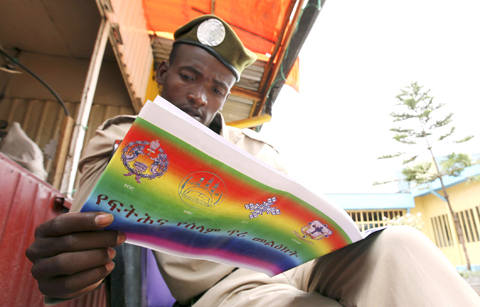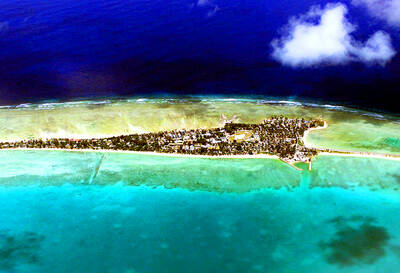Ethiopians voted yesterday in national elections that are expected to return long-serving Ethiopian Prime Minister Meles Zenawi to power in the first ballot since a disputed poll in 2005 turned violent.
The opposition admits it has little chance of victory, but says that is because the ruling Ethiopian People’s Revolutionary Democratic Front (EPRDF) has tightened its grip on power and routinely intimidates and jails its critics.
In 2005, riots broke out in the capital Addis Ababa when the EPRDF was declared winner. Security forces killed 193 protesters and seven policemen also died in trouble that tarnished the reputation of one of the world’s biggest aid recipients.

PHOTO: REUTERS
The EPRDF says it has since won popularity during a period of sustained economic growth by building roads, hydropower dams and electrifying villages in a country where nearly 10 percent of the population needed emergency food aid last year.
Some 32 million Ethiopians, 90 percent of eligible voters, were to make their choices at more than 43,000 polling stations.
While there has been some violence in the Oromia and Tigray regions, the capital appeared calm on polling day.
At the University of Addis Ababa, hundreds of students lined up quietly to vote in lecture halls. Election officials checked voting cards, put indelible ink on the thumbnail of each person and explained the party symbols on the ballot paper.
Students said the election cards had been distributed fairly, they felt free to vote for the party they wanted and they would accept the result.
“The process is very fair and it is democratic,” said Hirpa Kumela, a 21-year-old psychology student. “Yes, I’ll accept the results. I’m electing legally with my own attitude.”
Meles became leader of Ethiopia in 1991 when a rebel group led by him ousted a communist regime that killed hundreds of thousands of Ethiopians in a 17-year rule.
The biggest challenge comes from the eight-party coalition Medrek — or the Forum — that is united chiefly by its desire to unseat Meles and has put forward few actual policies.
Medrek is running 421 candidates for the 547-seat federal parliament, not as high as the EPRDF’s 521, but enough to form a clear majority should they pull off a shock win.
The next biggest opposition parties, the All Ethiopian Unity Organization and the Ethiopian Democratic Party are running 350 and 250 candidates respectively.
Western diplomats in Addis Ababa say they are anxious to see improvements in a secular country that is an ally in the fight against hard-line Islam in the region.
Outside the capital, both sides say members have died in politically motivated killings. Diplomats and staff of some foreign charities have been banned from leaving Addis Ababa without permission from authorities until after the poll.
In Tigray, the ruling party is facing a challenge from former members who fought with Meles over economic policy and how to deal with rival Eritrea.
The 55-year-old leader, who has represented Africa at international meetings, was lionized by the West in 1991. Then US president Bill Clinton called him one of a “new generation” of leaders who would bring democracy to the continent.
However, Meles has increasingly been criticized by rights groups who say he is becoming more autocratic and stifles dissent in the country of 80 million people.
Birtukan Mideksa, leader of one of the Medrek member parties and seen by analysts as a potential replacement for Meles, is in prison accused of violating the terms of a pardon that released her from a previous jail spell in 2007.
In her stronghold in the capital, there was steady trickle of voters at a technical college. Election officials explained the process and the ballot paper to each person and, again, voters said they felt free to vote as they pleased.

DISASTER: The Bangladesh Meteorological Department recorded a magnitude 5.7 and tremors reached as far as Kolkata, India, more than 300km away from the epicenter A powerful earthquake struck Bangladesh yesterday outside the crowded capital, Dhaka, killing at least five people and injuring about a hundred, the government said. The magnitude 5.5 quake struck at 10:38am near Narsingdi, Bangladesh, about 33km from Dhaka, the US Geological Survey (USGS) said. The earthquake sparked fear and chaos with many in the Muslim-majority nation of 170 million people at home on their day off. AFP reporters in Dhaka said they saw people weeping in the streets while others appeared shocked. Bangladesh Interim Leader Muhammad Yunus expressed his “deep shock and sorrow over the news of casualties in various districts.” At least five people,

It is one of the world’s most famous unsolved codes whose answer could sell for a fortune — but two US friends say they have already found the secret hidden by Kryptos. The S-shaped copper sculpture has baffled cryptography enthusiasts since its 1990 installation on the grounds of the CIA headquarters in Virginia, with three of its four messages deciphered so far. Yet K4, the final passage, has kept codebreakers scratching their heads. Sculptor Jim Sanborn, 80, has been so overwhelmed by guesses that he started charging US$50 for each response. Sanborn in August announced he would auction the 97-character solution to K4

SHOW OF FORCE: The US has held nine multilateral drills near Guam in the past four months, which Australia said was important to deter coercion in the region Five Chinese research vessels, including ships used for space and missile tracking and underwater mapping, were active in the northwest Pacific last month, as the US stepped up military exercises, data compiled by a Guam-based group shows. Rapid militarization in the northern Pacific gets insufficient attention, the Pacific Center for Island Security said, adding that it makes island populations a potential target in any great-power conflict. “If you look at the number of US and bilateral and multilateral exercises, there is a lot of activity,” Leland Bettis, the director of the group that seeks to flag regional security risks, said in an

ON THE LAM: The Brazilian Supreme Court said that the former president tried to burn his ankle monitor off as part of an attempt to orchestrate his escape from Brazil Former Brazilian president Jair Bolsonaro — under house arrest while he appeals a conviction for a foiled coup attempt — was taken into custody on Saturday after the Brazilian Supreme Court deemed him a high flight risk. The court said the far-right firebrand — who was sentenced to 27 years in prison over a scheme to stop Brazilian President Luiz Inacio Lula da Silva from taking office after the 2022 elections — had attempted to disable his ankle monitor to flee. Supreme Court judge Alexandre de Moraes said Bolsonaro’s detention was a preventive measure as final appeals play out. In a video made